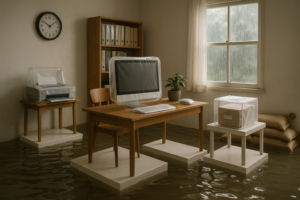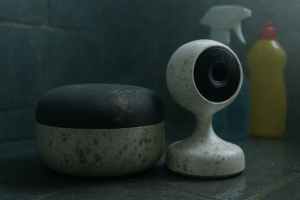Water leaks often catch people off guard. That slow drip under the sink or behind the washing machine can turn into a flooded room in no time. Smart leak detection sensors step in as a warning system. These devices do more than just signal a leak. They offer a sense of safety for homeowners and renters. In this article, we will examine what smart leak detection sensors are, how they work, and where they fit into modern living. We will also look at real user experiences to help you decide if adding a home water sensor makes sense for your property.
Understanding Smart Leak Detection Sensors
Smart leak detection sensors are electronic devices designed to pick up the earliest signs of unwanted moisture. Unlike traditional leak alarms, these smart devices connect to your phone or tablet. If water is detected, the sensor acts fast. Many models sound an alarm, flash a light, and send a notification through an app. Some advanced models can even shut off your main water supply. This instant reaction helps protect your belongings and property from damage. By detecting water before it pools and spreads, smart sensors give you valuable time to respond.
These sensors typically need minimal setup. Most run on batteries and use Wi-Fi for communication. Owners place them near high-risk spots such as under bathroom sinks, in laundry rooms, or by water heaters. By targeting these problem areas, the sensors can prevent minor leaks from turning into big issues. With smart leak detection, you stay informed whether you are home or away.
How Home Water Sensors Work
The core of every home water sensor is its ability to sense moisture. These gadgets contain metal contacts that close an electric circuit when they touch water. Once moisture is detected, the sensor responds in several ways. You might hear a piercing alarm or see a bright indicator light. More advanced models leverage Wi-Fi to send a push notification straight to your mobile device.
Some sensors offer extra features. They can detect the temperature and humidity, which is useful in spotting potential freeze threats or humidity problems. A few systems, such as Intelli-Sensor, add a major layer of safety by shutting off the water mains automatically when a leak is spotted. This is especially helpful if you travel a lot or own a second property. The goal is to alert you early, stop the water flow, and limit the damage.
Many devices work as standalone units. You put them in one or two high-risk places. Others become part of a connected home network. They can link to your security system, home automation tools, vocal assistants, or even a central water shutoff valve. These integrated systems let you manage everything from a single mobile app.
Homeowner and Renter Smart Leak Detection Tips
Smart leak detection is not just for homeowners. Renters can take full advantage of battery-powered, wireless sensors. You can place them behind toilets, under kitchen sinks, or near your washing machine. When you move out, just take them with you. No drilling or wiring required. This makes them the perfect portable safety tool.
For property owners, bigger solutions make sense. Integrated detection systems can connect with your building’s plumbing. Some let you control main water lines remotely or automatically stop water flow in emergencies. You can customize features to fit your property size and daily routine. Some sensors allow you to configure temperature ranges, humidity alerts, or custom water sensitivity for specific rooms.
Key locations to monitor include basements, bathrooms, kitchens, attics, and laundry rooms. Consider corners prone to roof leaks, water heater closets, and sump pump pits. By targeting the riskiest zones, you get the highest return on your investment.
Types of Smart Leak Detection Devices
Not all home water sensors are made the same. Today’s market features several styles. Each brings unique benefits for different situations.
Standalone Sensors are placed individually in leak-prone spots. They offer simple setup and are best for apartments or small homes. You can add more units over time. These make leak detection flexible and easy to expand.
Integrated Systems are designed for larger homes or those with existing smart home networks. These sensors talk with central hubs, allowing you to track several rooms from one app. You might connect them to thermostats, smoke detectors, or smart speakers. These systems often allow for upgrades, such as connecting multiple kinds of sensors to monitor humidity, flooding, or freezing pipes.
Automatic Shutoff Systems go a step further. Not only do they notify you, but they also stop the water. When a leak is detected, a motorized valve closes the main supply to prevent additional damage. This is an attractive feature for busy families, elderly residents, or those away from home often.
Features That Set Devices Apart
A closer look at device features can make the buying decision easier. Audio and visual alerts help those who are home but may miss a subtle sign, like a slow drip. Mobile notifications reach you even if you are at work or traveling. Temperature and humidity monitoring provide early warning for pipe freezing or mold risks.
User-friendly installation is key for renters and first-time users. Battery life varies, with some sensors operating for years before needing a replacement. Others use a power cable for uninterrupted service. Waterproof and reusable sensors offer long-term savings. If a device can be moved and used again, its value increases with every use.
Systems with closed-loop monitoring add peace of mind. Some models support adding several contacts so that family members or property managers all receive alerts when trouble strikes. Integration with smart home platforms such as Amazon Alexa, Google Home, or Apple HomeKit can make managing your devices even more convenient. With the right combination of alerts, detection zones, and smart automation, your home’s risk of water damage shrinks dramatically.
Popular Home Water Sensor Brands
A few names stand out on the market. Each has features suited for different needs and homes.
The Phyn Smart Water Sensor notifies you through audible alarms, indicator lights, SMS, and app alerts. It also tracks temperature and humidity. Some users appreciate setting custom thresholds for unique spots in the home.
The Flo by Moen Smart Leak Detector monitors moisture around the clock. It connects directly with the Moen mobile app for alerts. Pairing the detector with the Flo Smart Water Monitor and Shutoff opens up automatic water shutoff options for larger protection.
For those looking for automatic response, the Intelli-Sensor stands out. This unit cuts off the water supply if it detects a leak, then notifies up to six contacts by SMS or email. Its battery power and non-contact style make it popular with users who want a reliable, hands-off solution.
Another option, EnviroSmarts, uses a wireless network designed for larger spaces. It provides alerts for water leaks, temperature, and humidity changes. It works well for property managers or anyone looking to monitor several areas with one system.
The leakSMART Wireless Waterproof Leak Detector Sensor offers reusable monitoring. It works hand-in-hand with a smart shutoff valve to stop leaks automatically as soon as water is detected. Its waterproof design keeps it safe through repeated use.
All of these brands promise reliable protection. The best pick for your home depends on budget, integration preferences, and the specific areas you need to monitor.
Real World Effectiveness and User Stories
Smart leak detection has stopped countless home disasters. One user of the Intelli-Sensor shared that their system detected a leak from a hot water tank. Thanks to the immediate notification, they intervened before any flooring or drywall was soaked. Others relay stories of sensors catching problems in rarely accessed basement corners or behind appliances, helping them avoid expensive repairs. Users with smart shutoff devices report peace of mind during vacations or business travel, knowing their home is protected even when far away.
Landlords and property managers have used systems like EnviroSmarts to monitor several properties remotely. By receiving early alerts, they reach out to tenants or send help before water damage spreads. These systems save both money and time compared to waiting for property visits to find issues. Insurance agents often recommend home water sensors to avoid costly claims. The optimism of these real-life accounts points to the practical utility of smart leak detection technology.
Cost Considerations and Long Term Savings
The price for a smart home water sensor ranges from moderate to high. Simple units can cost around fifty dollars. Those with advanced options like Wi-Fi, humidity, and automated shutoff can cost several hundred dollars. Larger homes may require a sensor for each at-risk zone. While the initial purchase may feel steep, the true cost comes into focus when compared to the price of fixing major leaks.
According to industry data, water damage is one of the top reasons for insurance claims. The average homeowner payout for water-related issues is over ten thousand dollars. Just one undetected leak can ruin floors, walls, and prized belongings in a matter of hours. Smart leak detection pays off by catching these small problems before they turn significant. Over time, many insurance companies may offer policy discounts if you install a qualifying leak detection device. These premium savings help offset the initial purchase.
Long-term home safety is another financial factor. The confidence gained from knowing your largest investment is protected reduces worries and brings a safer living environment. For landlords, detection systems cut lost rental income by keeping units dry and minimizing the need for major repairs between tenants. In short, while there is an upfront price tag, the investment brings lasting value when compared to the risks and expenses of unchecked water damage.
Installation and Integration Tips
Installation can be quick for wireless, battery-operated home water sensors. Renters should look for peel-and-stick sensors or those using non-permanent mounts. Homeowners have broader integration choices. Professional installation is sometimes useful for connecting automatic shutoff systems or for large homes with complicated plumbing networks.
Decide where your risks are highest. Kitchens, laundry rooms, bathrooms, water heater closets, and basements are the usual suspects. Once installed, perform a simple test to make sure alerts are received. Use the app to register all your smart leak detection devices. Configure which family members or contacts will get notifications. If your model tracks humidity or temperature, set safe thresholds for your home environment. Proper installation improves reliability and reduces the risk of missing an early warning.
For those with existing smart home systems, integration can be seamless. Apps let you connect leak sensors to voice assistants or multi-function hubs. Record login credentials and device manuals in an accessible place for future reference. Set a calendar reminder for battery checks or filter replacements. Annual maintenance helps these critical devices perform when you need them most. If you find setup confusing or want customized advice, consider contacting an expert for a consultation.
Comparing Smart Leak Sensors and Traditional Monitors
Old fashioned leak alarms only sound a siren when water is present. They fail if no one is home to hear them. Smart leak detection fixes this by reaching you wherever you are. With features like Wi-Fi connectivity, mobile alerts, and automatic shutoff, modern home water sensors greatly reduce the chance of water escaping undetected. Traditional monitors can be cost-effective for the smallest homes or apartments where someone is always present. However, they provide limited value for busy households, travelers, property managers, or large buildings.
Smart leak detection adapts to changing technology. Software updates add fresh features and security protections. App integration brings greater control and customization. They are more than alarms. They are full home protection tools capable of connecting with other smart home equipment. For most users, the added peace of mind, combined with practical benefits, makes these modern devices a wise choice compared to older technology.
Insurance Benefits Linked to Leak Detection
Insurance providers recognize the value of proactive prevention. Many insurers promote discount programs for customers installing a home water sensor. By acting before a leak becomes destructive, you reduce your risk profile. This results in savings on your insurance premiums. When shopping for coverage, ask if your agent offers incentives for using qualified devices. Proof of purchase or installation might be needed for discounts.
For larger properties or multi-unit buildings, installing linked smart leak detection systems allows building managers to keep a watchful eye across several apartments. This reduces the frequency and cost of claims. It also leads to quicker repairs and less disruption for tenants. Lower insurance premiums and fewer emergency repairs combine to create significant value for building owners over time.
Choosing the Best Solution for Your Needs
The right smart leak detection setup depends on your goals. If safety and quick alerts are your biggest priorities, pick a sensor with loud alarms and mobile notifications. If avoiding large-scale damage is the top concern, consider investing in a model with automatic shutoff. Renters benefit from portable, battery-powered units that require no permanent changes. Homeowners with complicated plumbing should look for an integrated network of sensors covering each risk zone.
Determine how easily you want to scale your system. Some brands allow adding more sensors over time. Others require a full package upfront. Choose devices with user-friendly apps and customer support, in case you need help troubleshooting. Battery life, water resistance, app features, and smart home compatibility matter for daily convenience. If you need guidance on selection or installation, consult professionals who specialize in home water sensor systems. An expert can evaluate your home’s layout, risk factors, and integration needs.
Keeping Your Property Safe from Water Damage
Smart leak detection is no longer a luxury. It is a reliable way to protect properties against water damage. The peace of mind offered by instant alerts, clear notifications, and automatic shutoff makes a real difference when every second counts. By pairing technology with practical prevention, you reduce stress and avoid costly repairs. As households become more connected, these sensors play a vital role in keeping homes safe for years to come.
If you want personalized advice, installation tips, or help choosing a smart home water sensor, reach out to our team at All Nation Restoration. We are passionate about keeping your property safe from water damage. Our expert technicians can recommend the perfect solution, handle installation, and make sure your system works from day one. Protect your investment with smart leak detection and let us help provide peace of mind. Call All Nation Restoration today for a free consultation on the best way to keep your property safe from unexpected leaks.







